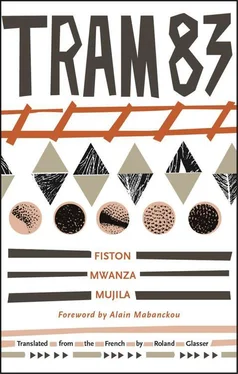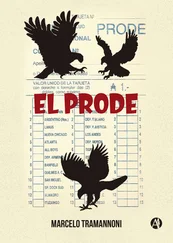“Why do you do that, Émilienne?”
“I don’t understand.”
“What’s got into you to colonize these young girls? Don’t you think they deserve better than to be sold for a pittance?”
“What?”
“They’re minors. Elsewhere, you’d go to prison.”
Angered by these statistics, Émilienne lost her temper.
“You got any work to give them?”
“These girls are still kids.”
“Age is not a factor! Even the dissident General knows this.”
“Listen …”
“I defy anyone to prove me wrong!”
“You’re mistaken.”
She took advantage of the occasion to thumb her nose at all Lucien’s singular theories, even calling him impotent.
They arrived at her place at four in the morning. Lucien went into the kitchen and packed his bags, or rather his imitation-leather satchel and his computer.
“I have nothing against you but I think I need to leave for the sake of my conscience.”
“Where to?”
Lucien’s mannerisms grated. Someone retrieves you like a garbage bag and you want to spoil the party for a question of conscience! What the hell is your conscience doing in a story that you don’t need to be a writer to understand? You’re nothing and you want to act like a big shot. What ingratitude! A guy shows up at a woman’s place and she gives him food, drink, clothing, and pocket money, but he gets up one fine morning with a question of conscience! To cap it all, you still want to pass yourself off as a whipping boy.
“Listen, Lucien, I’m sorry about before. I lost my temper. Listen.”
“No. I don’t want to live off dirty money.”
She even begged him.
“I’m so sorry.”
“I can’t live off the bodies of those little girls!”
Lucien, what a clown! If you don’t want to live off the bodies of those little girls then earn money yourself, stand on your own two feet, go rescue all the decrepit-single-mamas on earth, build schools for former-baby-chicks, start an NGO, find them work.
“I’m sorry.”
“You should have told me.”
Lucien, what you forget is that she has always loved you and that she has suffered for you. It’s annoying to come across individuals like that, with no conscience, ungrateful to the bone. She knelt, weeping, in front of the door to prevent him leaving, but he made it all the same, shoving her out the way.
He left behind him the clothes, the phone, the money — in short, everything she’d given him.
Why do you keep trying to exceed the limit of tolerability? What kind of man are you? Is the reality of life not sufficient for your conscience? Must you deprive yourself of the pleasures of the underbelly to be a writer? What idiocy to want to pass yourself off as a hero? Ultimately, what exactly is the conscience of a writer who won’t open his eyes?
THE RETURN OF THE ANIMAL-MAN.
Malingeau hadn’t been seen at the Tram for several months. Gossip started by the waitresses and the busgirls, propagated by the single-mama-post-baby-chicks, and then relayed by the secondhand tourists, circulated throughout the City-State: he was suffering from an incurable disease. Some baby-chicks even maintained that he’d been flown home to Switzerland in critical condition. Requiem couldn’t help ordering rounds for the entire Tram. For the Negus, one thing was sure: Malingeau was no longer of this world. Every evening at the Tram he demonstrated, like a proper parrot, the extent to which this demise was a relief not only for the whole Tram but also for the whole City-State. As soon as he showed up, he took Malingeau’s table and imitated him to the letter. This caused hilarity among the head baby-chicks and the secondhand tourists.
Good things never last, so they say. One Saturday like any other, around 5 P.M., a rumor began to spread along Peace Boulevard, Constitution Street, and Stanley Road, before spilling into the Tram: Ferdinand Malingeau was very much alive, and had left Geneva, crossed the border of the City-State this morning, and would surely come to Tram 83 this evening.
It was a custom among the for-profit tourists that whenever they returned from their own countries, they would buy five or six rounds for everyone in the course of the night. Which drove even the craziest who hung out on the Main Square to venture into Tram 83.
As the sun sank ever lower, the rumors grew and took the shape of truth. Firstly through the machinations of the for-profit tourists. It was a whole ritual. Upon the return of one of their own from a long trip, they took themselves along to Tram 83 from 5 P.M. to welcome them, bearing orchids, elegantly turned-out, well dressed, well groomed, and well perfumed like Papa Wemba the year he recorded Viva la Musica . They came with their wives and their children. They sponsored the music of the day, meaning that which suited their taste. They gave the Tram’s owner a pot of cash so that an improvised band, composed almost exclusively of for-profit tourists, could play for the occasion. Songs from their own countries, sometimes even into the small hours. It was a beautiful thing to be involved in such concerts. Each tourist could request a song of their choice and the band would play it there and then. The European tourists would cry on these occasions. They requested songs that reminded them of their youth, that time forever lost. And the usual nostalgia that arises whenever one finds oneself an exile hit them full in the face.
To avoid an unnecessary crush, the Tram’s owner would choose the evening’s participants on the fly. Everyone agreed on the quota. It was conceived in such a way that all social strata of the City-State would be represented. For example, they might take ten baby-chicks, ten-post-baby-chicks, ten students, ten mercenaries, ten diggers, ten Chinese tourists, and, finally, ten slim-jims. The remaining seats were reserved for the direct beneficiaries, the for-profit tourists and their families. That was another thing about Tram 83. You could arrange an evening and handpick the guests of your choice. You simply had to fork out the required pot of cash and kick everyone out, including the for-profit tourists, unless the latter bought out the same evening with a larger pot of cash than your own. But for lowly folk like us, booking the Tram for an evening was beyond our means. We couldn’t allow ourselves such eccentricities.
Around the 1930s, an enormously wealthy tourist liked to hand over the pot of cash and entertain just five or six of his friends. Today’s tourists are kinder in this regard. Just imagine, the whole of Tram 83 outside simply because an individual and his buddies want to drink their beer in comfort. Not knowing what the hell to do with themselves, the Tram regulars would hang around eating dog kebabs, or leave to go finish the night at the Cuba Club, known for its fifty-four types of salsa. You arrive, and the waitresses or busgirls hand you two menu cards, one for the grub and another for the salsa.
It is highly possible that nobody went off to work that evening. Even the mercenaries forsook the mines to gratify us with their presence. Who could miss such an event? Everyone flocked to the Tram, on foot, by bicycle, on motorbikes, or in beat-up cars. The crowd stretched as far as the station whose unfinished metal structure …
8:15. 10:30. 11:15. Malingeau still hadn’t showed his face. He turned up around three in the morning. The Diva welcomed him with a song crooned partially in Armenian. Applause followed applause. Lucien went unnoticed in the crush created by the arrival of the Tram’s new darling and the mass of bodyguards.
“Foreplay is for tourists. We like to eat straightaway.”
Dressed all in white, Malingeau mounted the podium erected in his honor and greeted the assembled company in an African language. Ten minutes of applause, interspersed with hearty shouts of “Ferdinand Malingeau! Ferdinand Malingeau!”
Читать дальше












